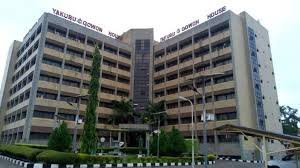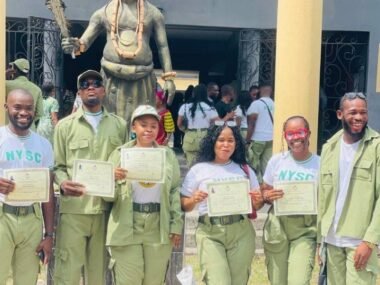Graduates mobilized for the National Youth Service Corps (NYSC) in Nigeria are those who have completed a degree or Higher National Diploma (HND) program from accredited tertiary institutions, including universities, polytechnics, and monotechnics, recognized by the National Universities Commission (NUC), National Board for Technical Education (NBTE), or other relevant regulatory bodies. This article explores the eligibility criteria, types of institutions whose graduates qualify, and key considerations for NYSC mobilization to guide prospective corps members.
Understanding which institutions qualify is very important because the NYSC certificate — whether discharge, exemption, or exclusion — is often required for employment, political appointments, and further studies in Nigeria.
Which Tertiary Institution Graduates Are Mobilized For NYSC
1. Nigerian Universities
All graduates from federal, state, and accredited private universities in Nigeria are mobilized for NYSC. The NUC (National Universities Commission) regulates Nigerian universities, and only institutions fully recognized by the NUC appear on NYSC mobilization lists.
Even within recognized universities, course accreditation matters. For example, if a university is accredited but your course is still under “interim” or “denied” status, your mobilization may face challenges.
Examples of mobilized universities include:
-
Federal: University of Lagos (UNILAG), Ahmadu Bello University (ABU), University of Nigeria, Nsukka (UNN).
-
State: Lagos State University (LASU), Ambrose Alli University (AAU), Rivers State University.
-
Private: Covenant University, Afe Babalola University, Babcock University.
2. Nigerian Polytechnics
Polytechnic graduates are also mobilized provided their institution is approved by the NBTE. This covers both federal and state polytechnics.
Key points to note:
-
Only graduates with an HND (Higher National Diploma) are mobilized.
-
OND (Ordinary National Diploma) holders must proceed to HND before being eligible.
-
Polytechnics with expired or revoked accreditation may have their graduates disqualified.
Examples include:
-
Yaba College of Technology (YABATECH).
-
Federal Polytechnic Nekede.
-
Kaduna Polytechnic.
-
The Polytechnic, Ibadan.
3. Colleges of Education
Graduates from colleges of education are recognized by the NCCE (National Commission for Colleges of Education). Most of them award the Nigerian Certificate in Education (NCE).
While many NCE holders do not proceed directly into NYSC, those who later upgrade to a bachelor’s degree (through direct entry) are mobilized. Still, it’s worth noting that accredited colleges are part of the tertiary institutions officially recognized.
4. Foreign-Trained Graduates
Nigerians who studied abroad are mobilized if their institution is recognized in the country of study and their certificate is validated in Nigeria. To qualify:
-
The graduate must present their original certificate and transcript.
-
They must be cleared by the Evaluation and Accreditation Department of the Federal Ministry of Education.
-
They must pass through the NYSC verification process at designated centers.
For example, a Nigerian who studied in the UK, USA, Ghana, or Ukraine can be mobilized, provided the institution is legitimate and approved.
5. Legal Framework Behind Mobilization
The NYSC Act (1973, amended in 1993) makes it mandatory for every Nigerian graduate (under 30 years at the time of graduation) to serve the country for one year. Section 2 of the Act specifically states that only graduates from “approved institutions of higher learning” can be mobilized. This is why accreditation is non-negotiable.
6. Categories of Graduates Not Mobilized for NYSC
Even if you graduate from a recognized institution, you may still not be mobilized under certain conditions:
-
Graduates above 30 years old at graduation – They receive exemption certificates instead.
-
Part-time graduates – They are issued exclusion letters, not deployed to camps.
-
Graduates from unapproved or unaccredited institutions – Automatically disqualified.
-
Those with forged certificates – Permanently disqualified and possibly prosecuted.
7. Why Accreditation Matters
There have been cases where graduates were left stranded because their institutions were later discovered to be unaccredited or illegal. For example, some so-called “degree mills” in West Africa issue certificates not recognized in Nigeria.
To avoid such issues:
-
Check if your school is listed on the NUC, NBTE, or NCCE website.
-
Confirm if your course has full accreditation before enrolling.
-
If studying abroad, verify the status of your school with the host country’s education ministry.
8. How Mobilization Works in Practice
Here’s a step-by-step of how graduates get mobilized:
-
Institutions submit graduate lists to NYSC.
-
NYSC cross-checks with regulatory bodies (NUC, NBTE, NCCE).
-
Eligible graduates are uploaded to the NYSC portal.
-
Graduates register online, choose four states of deployment, and print call-up letters.
-
Those cleared are mobilized to orientation camps across Nigeria.
Conclusion
The NYSC mobilizes graduates from accredited Nigerian universities, polytechnics, and monotechnics, as well as foreign-trained graduates whose institutions are recognized by relevant authorities, provided they meet age and documentation requirements. Understanding these eligibility criteria is crucial for prospective corps members to prepare for mobilization. To ensure a smooth process, graduates should verify their institution’s accreditation with the NUC or NBTE, gather required documents early, and monitor official NYSC channels like www.nysc.gov.ng and @officialnyscng for updates on mobilization schedules and guidelines.







